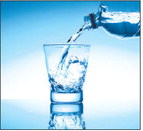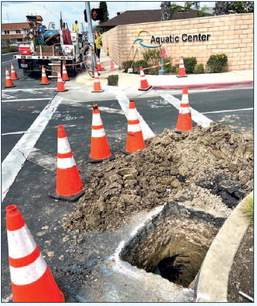Conserving water can save on assessments


DROUGHT NEWS
California is now facing its most serious drought since the mid-2010s. The California drought, part of the most expansive western U.S. drought this century, is locked in place for awhile.
According to the May 25 Drought Monitor analysis, the entire state of California is in drought, and 26 percent of the state is in “exceptional drought,” the highest category.
The last exceptional drought in California was January 2017, on the tail end of a multiyear drought. It was considered the worst in parts of the state in 450 years.
In view of the fact that the next widespread rain and mountain snow is months away, water conservation is an important commitment for all Leisure World residents.
Not only is it environmentally significant, it will help keep assessments as low as possible. Residents can reduce water consumption by 20-40 percent without purchasing expensive equipment. Reducing water use can mean substantial savings on water, sewage, and energy bills. The following suggestions will help you get in the habit of saving water. Here is how you can help: Kitchen/Laundry Aid Large appliances—washing machines and dishwashers— consume the most water, so they are important places to start any water-conservation efforts.
• Set the water level on your washing machine to match the size of your load. Try to avoid doing frequent small loads; whenever possible, run the machine only when you have a full load.
• You do not need to rinse dishes before putting them in the dishwasher. No, really, hand rinsing dishes under the faucet uses 15-18 gallons of water per load. If your dishwasher has a pre-rinse cycle, try using it instead of hand rinsing. If a dish or two isn’t completely clean after the dishwasher cycle, finish the job by hand.
• Like the washing machine, only run the dishwasher when it’s full. If you have only a few dishes, wash them by hand in a sink or basin—not under a running faucet. Use a second basin or dishpan for rinsing, or spray rinse all the soapy dishes at once.
Conserving in the Bath
After these major appliances, the bathroom offers the next biggest opportunity to save water.
• Make sure your toilets are all working efficiently. According to the American Water Works Association, the average American home loses 14 percent of all water used to leaks. Remember, the toilet is not a waste basket. If you think you have a problem, call your Mutual director.
• Keep your showers as brief as possible, or turn the water off while shaving or scrubbing in the stall.
• If you have a bathtub, when taking a bath, close the drain while the water warms up then adjust the temperature. Monitor the tub as it fills and turn the water off at the half-way mark.
• Turn off tap water while brushing your teeth.
Running Hot and Cold
• There is nothing as refreshing as a cold drink of water, but don’t let the faucet run to get it. Chill a container of water in the refrigerator instead.
• Avoid running hot tap water over frozen food to defrost it; put it in the refrigerator the night before.
• Rethink any tasks you usually perform under running water—like washing vegetables or brushing your teeth. (A gallon of water a minute flows through a tap that is only half-open.) Use a dishpan or bowl of water instead of letting the tap run. Then pour the water from the bowl on your house plants.
Outdoors
• Use a broom before you get the garden hose out to wash off the patio or sidewalk. If you notice sprinkler problems, alert your Mutual director. Use the car wash located at Clubhouse 2 instead of the hose to wash your car; water is recycled at the LW car wash.
• Do not water Mutual lawns yourself. If you notice a problem with the irrigation system, contact your Mutual director or contact Kevin Black at (562) 431-6586, ext. 359. “Used” Water
• Before pouring that halffilled glass of water down the sink, ask yourself where it could be put to good use? How about pouring it in the dog’s bowl or on plants? Other sources of “used” water are suitable for reuse—it just takes a little imagination and a change in routine.
Water conservation begins with each of us.
If each member makes a few simple adjustments in household routine, the community can conserve thousands of gallons of water and save thousands of dollars each year.
So remember: Use Water Wisely, Save Water, (because) Every Drop Counts and None Should Be Wasted.
—Kevin Black Physical Property



